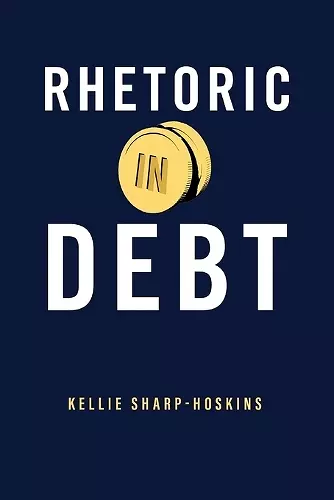Rhetoric in Debt
Format:Paperback
Publisher:Pennsylvania State University Press
Published:1st Oct '24
Currently unavailable, and unfortunately no date known when it will be back
This paperback is available in another edition too:
- Hardback£92.99(9780271095301)

In recent years, household indebtedness in the United States reached its highest levels in history. From mortgages to student loans, from credit card bills to US deficit spending, debt is widespread and increasing.
Drawing on scholarship from economics, accounting, and critical rhetoric and social theory, Kellie Sharp-Hoskins critiques debt not as an economic indicator or a tool of finance but as a cultural system. Through case studies of the student-loan crisis, medical debt, and the abuses of municipal bonds, Sharp-Hoskins reveals that debt is a rhetorical construct entangled in broader systems of wealth, rule, and race. Perhaps more than any other social marker or symbol, the concept of “debt” indicates differences between wealthy and poor, productive and lazy, secure and risky, worthy and unworthy. Tracking the emergence and work of debt across temporal and spatial scales reveals how it exacerbates vulnerabilities and inequities under the rhetorical cover of individual, moral, and volitional calculation and equivalency.
A new perspective on a serious problem facing our society, Rhetoric in Debt not only reveals how debt organizes our social and cultural relations but also provides a new conceptual framework for a more equitable world.
“An authoritative reading of debt’s disastrous function at a period of persistent global inequality and deepening economic misery. For rhetoricians turning toward these concerns, it is indispensable reading.”
—James Rushing Daniel Rhetoric Society Quarterly
“To those interested in affect studies, this book offers an original application of two concepts: stickiness and circulation. To those interested in debt, this study offers a close analysis of how indebted subjectivity is created through everyday assumptions and rhetorical artifacts. Rhetoric in Debt gets to the granular level, explaining not only how indebted subjectification happens but also how we might look for indebted subjectification in other places. To those interested in the rhetoric of economics, this book offers a new topic and a fresh analytical method.”
—Mark Garrett Longaker, author of Rhetorical Style and Bourgeois Virtue: Capitalism and Civil Society in the British Enlightenment
ISBN: 9780271095295
Dimensions: 229mm x 152mm x 14mm
Weight: 313g
204 pages